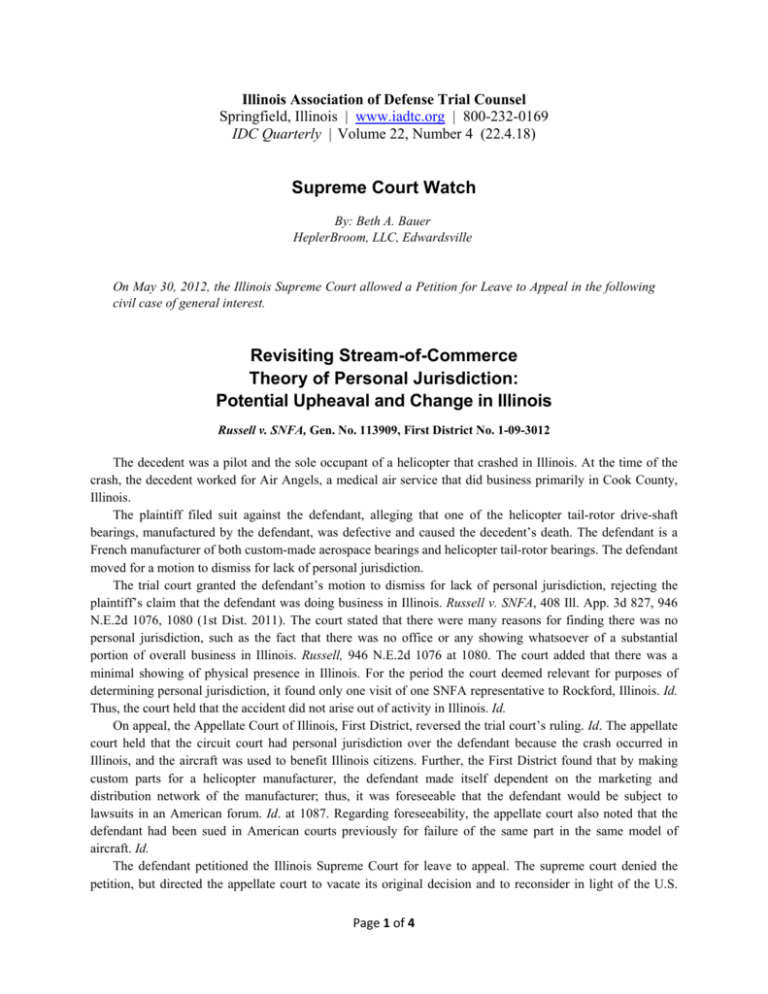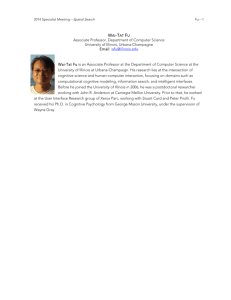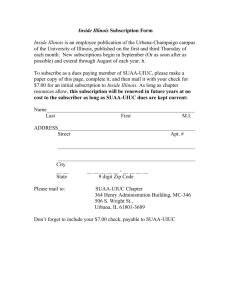
Illinois Association of Defense Trial Counsel
Springfield, Illinois | www.iadtc.org | 800-232-0169
IDC Quarterly | Volume 22, Number 4 (22.4.18)
Supreme Court Watch
By: Beth A. Bauer
HeplerBroom, LLC, Edwardsville
On May 30, 2012, the Illinois Supreme Court allowed a Petition for Leave to Appeal in the following
civil case of general interest.
Revisiting Stream-of-Commerce
Theory of Personal Jurisdiction:
Potential Upheaval and Change in Illinois
Russell v. SNFA, Gen. No. 113909, First District No. 1-09-3012
The decedent was a pilot and the sole occupant of a helicopter that crashed in Illinois. At the time of the
crash, the decedent worked for Air Angels, a medical air service that did business primarily in Cook County,
Illinois.
The plaintiff filed suit against the defendant, alleging that one of the helicopter tail-rotor drive-shaft
bearings, manufactured by the defendant, was defective and caused the decedent’s death. The defendant is a
French manufacturer of both custom-made aerospace bearings and helicopter tail-rotor bearings. The defendant
moved for a motion to dismiss for lack of personal jurisdiction.
The trial court granted the defendant’s motion to dismiss for lack of personal jurisdiction, rejecting the
plaintiff’s claim that the defendant was doing business in Illinois. Russell v. SNFA, 408 Ill. App. 3d 827, 946
N.E.2d 1076, 1080 (1st Dist. 2011). The court stated that there were many reasons for finding there was no
personal jurisdiction, such as the fact that there was no office or any showing whatsoever of a substantial
portion of overall business in Illinois. Russell, 946 N.E.2d 1076 at 1080. The court added that there was a
minimal showing of physical presence in Illinois. For the period the court deemed relevant for purposes of
determining personal jurisdiction, it found only one visit of one SNFA representative to Rockford, Illinois. Id.
Thus, the court held that the accident did not arise out of activity in Illinois. Id.
On appeal, the Appellate Court of Illinois, First District, reversed the trial court’s ruling. Id. The appellate
court held that the circuit court had personal jurisdiction over the defendant because the crash occurred in
Illinois, and the aircraft was used to benefit Illinois citizens. Further, the First District found that by making
custom parts for a helicopter manufacturer, the defendant made itself dependent on the marketing and
distribution network of the manufacturer; thus, it was foreseeable that the defendant would be subject to
lawsuits in an American forum. Id. at 1087. Regarding foreseeability, the appellate court also noted that the
defendant had been sued in American courts previously for failure of the same part in the same model of
aircraft. Id.
The defendant petitioned the Illinois Supreme Court for leave to appeal. The supreme court denied the
petition, but directed the appellate court to vacate its original decision and to reconsider in light of the U.S.
Page 1 of 4
Supreme Court’s recent stream-of-commerce theory of personal jurisdiction decisions in J. McIntyre
Machinery, Ltd. v. Nicastro, – U.S. –, 131 S. Ct. 2780 (2011) and Goodyear Dunlop Tires Operations, S.A. v.
Brown, – U.S. –, 131 S. Ct. 2846 (2011). Russell v. SNFA, 2011 IL App (1st) 093012-B, 965 N.E.2d 1 (1st
Dist. 2012).
The Appellate Court of Illinois, First District, reiterated its original decision, finding specific jurisdiction
under 735 ILCS 5/2-209(a)(2) and (c) (West 2002). Russell, 2011 IL App (1st) 093012-B, ¶ 27. The court
added that the McIntyre and Goodyear cases strengthened their original decision. Id. ¶ 2. The appellate court’s
opinion highlighted the fact that the defendant designed its tail-rotor parts in anticipation of sales in the forum
state. Id. ¶ 40. Additionally, the defendant left distribution of its custom-made parts to another company,
knowing the parts would be distributed throughout the United States. Based on discovery responses, the court
found sufficient sales of the parts and helicopters occurred in Illinois. Id. ¶¶ 45-46. Therefore, the appellate
court found that the defendant, through the contacts of the distributor, had minimum contacts with Illinois. Id.
¶ 47.
The defendant argues to the Illinois Supreme Court that the First District relied upon an incorrect standard
for determining personal jurisdiction under a stream-of-commerce theory. According to the defendant, the
McIntyre court endorsed a standard that requires a finding of purposeful conduct toward the forum state and
not merely foreseeability that the defendant’s product might be sold in the forum state. The defendant argues
that the McIntyre test focuses on whether a defendant was aware that its products would be sold in the forum
state as opposed to the number of sales in the forum state as the First District reasoned. Finally, the defendant
cites several Illinois cases, which it contends McIntyre implicitly affirm, recognizing the broader stream-ofcommerce theory of personal jurisdiction. See Wiles v. Morita Iron Works Co., Ltd., 125 Ill. 2d 144, 160
(1988); Dickie v. Cannondale Corp., 388 Ill. App. 3d 903, 907 (1st Dist. 2009); and Morris v. Halsey
Enterprises Co., Ltd., 379 Ill. App. 3d 574, 582 (1st Dist. 2008).
A Case of First Impression: What Does
“Any Workers’ Compensation Claim” Really Mean?
Skokie Castings, Inc., v. Illinois Insurance Guaranty Fund,
Gen No. 113873, First District No. 1-11-1533
The plaintiff is the successor to another manufacturing company (“the employer”), a qualified self-insurer,
whose employee was shot in the course and scope of her employment. The employer, seeking to protect itself
from large workers’ compensation claims, bought “Aggregate Excess Worker’s Compensation” and “Specific
Workers Compensation” insurance policies from its insurer. Under the terms of these policies, the insurer
would indemnify and reimburse the employer for any workers’ compensation judgment in excess of $200,000.
On February 6, 1985, the employee sustained a bullet wound to the head. The Illinois Industrial
Commission issued an order finding that the wound left the employee totally and permanently disabled. In
addition, the order directed the employer to pay for all reasonable and necessary medical costs and weekly
benefit payments of $394.24 for the rest of the employee’s life.
The employer exceeded the $200,000 policy threshold, triggering the insurer’s obligation to begin to
reimburse the employer for payments made to the employee. Subsequently, the insurer became insolvent,
leaving the employer to submit a claim to the Illinois Insurance Guaranty Fund (“the Fund”) to make the
payments owed to the employee.
Page 2 of 4
In May 2005, the Fund notified the employer that payment obligations to the employer were nearing the
$300,000 limit provided for by the Guaranty Fund Act (the “Act”), 215 ILCS 5/537.2 (West 2004). The Act
provides that the Fund’s obligation on any covered claim is capped at $300,000, except for “any workers’
compensation claims.” In August 2005, the Fund stopped paying the employee’s weekly benefits and the
employer resumed those payments.
In May 2010, the employer filed a declaratory judgment action seeking an order affirming the $300,000
statutory limit did not apply to the Fund’s obligation to pay the employee’s workers’ compensation award.
Both parties filed motions for summary judgment. The employer argued that the statutory language was
clear and unambiguous; thus the only interpretation of § 5/537.2 is that any workers’ compensation claim is
not subject to the statutory cap. Additionally, the employer contended that other states with similar laws have
ruled that payment on “any” workers’ compensation claim is free from statutory payment limits.
Principally, the Fund argued that its purpose was to provide a safety net for injured parties owed payments
by insolvent employers or insurers. As such, the Fund is obligated to pay an employee’s claim for benefits
under the Workers’ Compensation Act, but not an employer’s claim for reimbursement for an insolvent
insurer. The Fund also maintained that because it was only reimbursing the employer as part of an insurance
agreement, the employer’s claim was not eligible under the statutory exception that protects “any workers
compensation claim.”
The circuit court granted the employer’s motion for summary judgment, finding that the statutory cap did
not apply to the employer’s claim. The court reasoned that the legislature’s intent was to provide an exception
for both primary workers’ compensation policies and excess workers’ compensation policies. In making this
finding, the court looked to the dictionary definition of the word “any” to ascertain its plain meaning.
The trial court also relied on persuasive, out-of-state case law cited by the employer because both cases dealt
with interpretation of substantially similar statutes. See MGM Mirage v. Nevada Ins. Guar. Assoc., 209 P.3d 766
(Nev. 2009); and In re Delinquency Proceedings Against Mission Ins. Co., 816 P.2d 502 (N.M. 1991).
The Fund appealed the ruling of the circuit court to the Appellate Court of Illinois, First District. In a
unanimous opinion, the First District affirmed. Skokie Castings, Inc., v. Illinois Ins. Guar. Fund, 2012 IL App
(1st) 111533, ¶ 1, 964 N.E.2d 1225, 1226. The reasoning of the appellate court closely tracked that of the trial
court. Id. at 1229-31. The appellate court rejected the Fund’s argument that the insurer’s obligation to
reimburse the employer could not be considered a “workers compensation claim.” Id. ¶¶ 15-17. In finding
against the Fund, the appellate court reasoned that under the Workers’ Compensation Act, claims are not
limited to only employees, but can extend to claims of policyholders of workers’ compensation policies issued
by insolvent insurers. Id. This court, like the circuit court, relied on the dictionary definition of the term “any,”
to interpret the meaning of the exception to the statutory cap. Id.
Further, the appellate court found In re Delinquency Proceedings Against Mission Insurance Co. to be
persuasive authority because New Mexico has similar laws regarding limits to be paid on claims. 816 P.2d 502
(N.M. 1991). See also, N.M. Stat. Ann. § 59A–43–4(C) (1978). Also similar to Illinois law, New Mexico law
provided an exception to the state’s statutory limit for workers’ compensation claims. Skokie, 2012 IL App
(1st) 111533, ¶ 17. Ultimately, the court found that the Illinois legislature could have excluded reinsurance or
indemnity contracts from the Fund’s obligations, and thus as the statute is not limited, the Fund is liable for
“any workers compensation claims.” Id.
In its petition, the Fund argues that the decision of the First District should not become the law of Illinois
without review by the Illinois Supreme Court. The Fund contends that this case presents a clear statutory
interpretation issue upon which both the Illinois bench and bar need guidance. Primarily, the Fund argues that
the appellate court erred because its statutory interpretation would render meaningless the statute providing for
the Self-Insurer Advisory Board (an analogous body to the Fund that provides relief when a self-insured
employer becomes insolvent). The Fund also argues that the supreme court should clarify this issue because
Page 3 of 4
the out-of-state authority is inconsistent. See MGM Mirage v. Nevada Insurance Guaranty Association, 209
P.3d 766 (Nev. 2009); and In re Delinquency Proceedings Against Mission Insurance Co., 816 P.2d 502 (N.M.
1991). But see In re Claim of National Union Fire Insurance Co., A3876-06T2, 2008 WL 516290 (N.J. Super.
Ct. App. Div. Feb. 28, 2008). Finally, the Fund maintains that the determination of whether qualified selfinsurers, whose excess workers’ compensation insurer becomes insolvent, may file claims with the Fund is of
sufficient importance to insurers and employers to warrant supreme court review.
About the Author
Beth A. Bauer is a partner of HeplerBroom, LLC. Ms. Bauer is a litigation attorney with a primary emphasis in the defense of
complex, multi-party civil cases and class actions, involving all aspects of consumer fraud, product liability, particularly
pharmaceuticals, construction, and insurance litigation. Ms. Bauer also regularly handles appeals and consults with others in the firm
on appellate issues. Ms. Bauer is a member of IDC, Illinois Appellate Lawyers Association, DRI, and Christian Legal Society. She has
authored the Supreme Court Watch column for IDC Quarterly since 2001 and served on the Editorial Board of that publication since
2009. Ms. Bauer earned her B.A. in Secondary Education and English Literature from Washington University in St. Louis in 1997 and
her J.D., cum laude, from Saint Louis University School of Law in 2000.
About the IDC
The Illinois Association Defense Trial Counsel (IDC) is the premier association of attorneys in Illinois who devote a substantial
portion their practice to the representation of business, corporate, insurance, professional and other individual defendants in civil
litigation.
For more information on the IDC, visit us on the web at www.iadtc.org.
Statements or expression of opinions in this publication are those of the authors and not necessarily those of the association.
IDC Quarterly, Volume 22, Number 4. © 2012. Illinois Association of Defense Trial Counsel. All Rights Reserved. Reproduction in
whole or in part without permission is prohibited.
Illinois Association of Defense Trial Counsel, PO Box 588, Rochester, IL 62563-0588, 800-232-0169, idc@iadtc.org
Page 4 of 4






